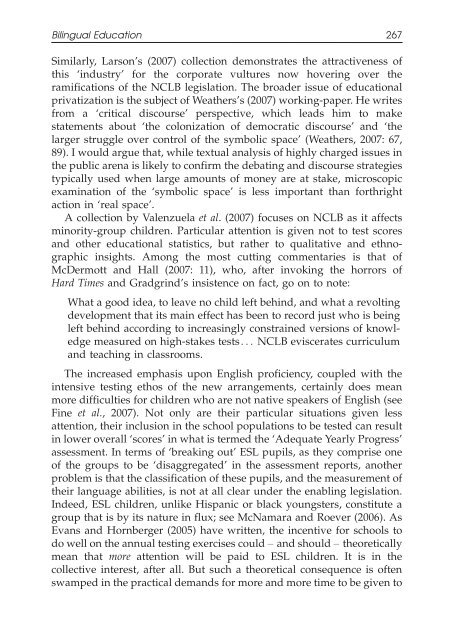Language Diversity in the Classroom - ymerleksi - home
Language Diversity in the Classroom - ymerleksi - home
Language Diversity in the Classroom - ymerleksi - home
- No tags were found...
You also want an ePaper? Increase the reach of your titles
YUMPU automatically turns print PDFs into web optimized ePapers that Google loves.
Bil<strong>in</strong>gual Education 267Similarly, Larson’s (2007) collection demonstrates <strong>the</strong> attractiveness ofthis ‘<strong>in</strong>dustry’ for <strong>the</strong> corporate vultures now hover<strong>in</strong>g over <strong>the</strong>ramifications of <strong>the</strong> NCLB legislation. The broader issue of educationalprivatization is <strong>the</strong> subject of Wea<strong>the</strong>rs’s (2007) work<strong>in</strong>g-paper. He writesfrom a ‘critical discourse’ perspective, which leads him to makestatements about ‘<strong>the</strong> colonization of democratic discourse’ and ‘<strong>the</strong>larger struggle over control of <strong>the</strong> symbolic space’ (Wea<strong>the</strong>rs, 2007: 67,89). I would argue that, while textual analysis of highly charged issues <strong>in</strong><strong>the</strong> public arena is likely to confirm <strong>the</strong> debat<strong>in</strong>g and discourse strategiestypically used when large amounts of money are at stake, microscopicexam<strong>in</strong>ation of <strong>the</strong> ‘symbolic space’ is less important than forthrightaction <strong>in</strong> ‘real space’.A collection by Valenzuela et al. (2007) focuses on NCLB as it affectsm<strong>in</strong>ority-group children. Particular attention is given not to test scoresand o<strong>the</strong>r educational statistics, but ra<strong>the</strong>r to qualitative and ethnographic<strong>in</strong>sights. Among <strong>the</strong> most cutt<strong>in</strong>g commentaries is that ofMcDermott and Hall (2007: 11), who, after <strong>in</strong>vok<strong>in</strong>g <strong>the</strong> horrors ofHard Times and Gradgr<strong>in</strong>d’s <strong>in</strong>sistence on fact, go on to note:What a good idea, to leave no child left beh<strong>in</strong>d, and what a revolt<strong>in</strong>gdevelopment that its ma<strong>in</strong> effect has been to record just who is be<strong>in</strong>gleft beh<strong>in</strong>d accord<strong>in</strong>g to <strong>in</strong>creas<strong>in</strong>gly constra<strong>in</strong>ed versions of knowledgemeasured on high-stakes tests... NCLB eviscerates curriculumand teach<strong>in</strong>g <strong>in</strong> classrooms.The <strong>in</strong>creased emphasis upon English proficiency, coupled with <strong>the</strong><strong>in</strong>tensive test<strong>in</strong>g ethos of <strong>the</strong> new arrangements, certa<strong>in</strong>ly does meanmore difficulties for children who are not native speakers of English (seeF<strong>in</strong>e et al., 2007). Not only are <strong>the</strong>ir particular situations given lessattention, <strong>the</strong>ir <strong>in</strong>clusion <strong>in</strong> <strong>the</strong> school populations to be tested can result<strong>in</strong> lower overall ‘scores’ <strong>in</strong> what is termed <strong>the</strong> ‘Adequate Yearly Progress’assessment. In terms of ‘break<strong>in</strong>g out’ ESL pupils, as <strong>the</strong>y comprise oneof <strong>the</strong> groups to be ‘disaggregated’ <strong>in</strong> <strong>the</strong> assessment reports, ano<strong>the</strong>rproblem is that <strong>the</strong> classification of <strong>the</strong>se pupils, and <strong>the</strong> measurement of<strong>the</strong>ir language abilities, is not at all clear under <strong>the</strong> enabl<strong>in</strong>g legislation.Indeed, ESL children, unlike Hispanic or black youngsters, constitute agroup that is by its nature <strong>in</strong> flux; see McNamara and Roever (2006). AsEvans and Hornberger (2005) have written, <strong>the</strong> <strong>in</strong>centive for schools todo well on <strong>the</strong> annual test<strong>in</strong>g exercises could and should <strong>the</strong>oreticallymean that more attention will be paid to ESL children. It is <strong>in</strong> <strong>the</strong>collective <strong>in</strong>terest, after all. But such a <strong>the</strong>oretical consequence is oftenswamped <strong>in</strong> <strong>the</strong> practical demands for more and more time to be given to
















